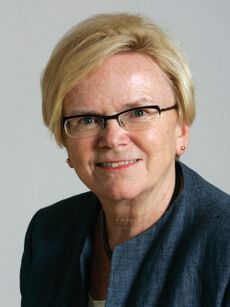Marija-Liisa Kulmala
This article is incomplete because it is pending further input from participants, or it is a work-in-progress by one author. Please comment on this article's talk page to share your input, comments and questions. Note: To contribute to this article, you may need to seek help from the author(s) of this page. |
Marija-Liisa Kulmala | |
|---|---|
 Kulmala in 2018 | |
| SCO Executive Chairperson | |
| In office March 5, 2016 – March 5, 2021 | |
| Preceded by | Rostom Lobzhanidze |
| Succeeded by | Daria Mileska |
| Minister of Foreign Affairs | |
| In office November 1, 2007 – January 16, 2011 | |
| Preceded by | Tapani Asikainen |
| Succeeded by | Ali Järvenpää |
| Personal details | |
| Born | September 22, 1947 Koskunen, Vichodnia, Soravia |
| Nationality | Kantemoshan |
| Political party | Solidarity Front (2006–2016) |
| Spouse | Jani Kulmala (m. 1999) |
| Children | 2 |
| Education | University of Koskunen |
| Occupation | Lawyer |
Marija-Liisa Kulmala (born 22 September 1947; aged 72) is a Kantemoshan politician and lawyer. Previously, she had been a member of Kantemosha's centre-right Solidarty Front from 2006 to 2016, serving as Minister of Foreign Affairs between 2007 and 2011, as well as serving a tenure as SCO Executive Chairperson from 2016 to 2021.
Kulmala was born in Koskunen in 1947, shortly after the Solarian War, and grew up through Narozalica's large economic reorganisation following the war. She attended the University of Koskunen to complete a degree in law from 1965 to 1970 and was employed as a lawyer in 1971. Sporting an illustrious law career lasting 35 years, Kulmala entered politics by joining Kantemosha's Solidarity Front in 2006. Her notoriety as a lawyer made her a popular member of the party, and in 2007 was promoted to Minister of Foreign Affairs, serving until 2011. Remaining in the party, Kulmala took a focus on Samorspi in 2011 and was appointed as Kantemosha's primary Samorspi delegation in 2013, a post she still holds. As part of the chairperson's rotational structure, Kulmala became SCO Executive Chairperson in 2016.
Contemporaries of Kulmala often describe her as centre-right to right-wing, and throughout her political career she has held a number of controversial opinions, including outspoken anti-abortion and anti-LGBT views, which has seen her criticised by many other regional organisations. She is generally well-received within the Samorspi states, and has overseen the introduction of numerous programs aimed to promote further geopolitical cooperation between the Samorspi states, however remains an avid opponent of Kantemoshan membership of the Tsivebi Military Agreement.